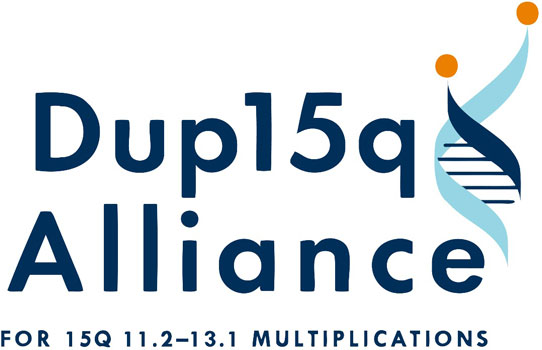The Foundation for Angelman Syndrome Therapeutics (FAST), Angelman Syndrome Foundation (ASF), Dup15q Alliance and Foundation for Prader-Willi Research (FPWR) announce a collaborative initiative to fund the addition of chromosome 15 conditions to Early Check, a flexible framework amenable to screening for a variety of conditions. Led by RTI International, Early Check will support the infrastructure necessary to add Angelman syndrome, Prader-Willi syndrome, and Dup15q syndrome to the Newborn Screening Panel.
Angelman syndrome, Prader-Willi syndrome and Dup15q are collectively recognized as chromosome 15 (C15) conditions. Each condition results in inappropriate DNA methylation patterns, which causes the disruption of imprinted gene regulation. The three conditions have can have very different symptoms, however they each share chromosomal origins and diagnostic options. Angelman syndrome, Prader-Willi syndrome and Dup15q are targets for emerging therapeutics, including promising disease-modifying strategies, that can potentially benefit greatly from early diagnosis. Newborn screening (NBS) provides the only population-based strategy to identify newborns who could benefit from early disease detection and treatment, as well as more accurately understand the prevalence of each disorder in a prospective manner.
Early Check was developed to create the necessary infrastructure for rare diseases to be included in the Newborn Screening Panel. The results from Early Check studies provide evidence for true disease prevalence, patterns of symptom onset, natural history and clinical outcomes, all of which are necessary to accelerate development of new outcomes, including the implementation of screening for new conditions.
“Newborn screening is an important public health program that helps identify infants with conditions before symptoms emerge, allowing for earlier treatment and eliminating the often stressful diagnostic odyssey for families,” said Anne Wheeler, Ph.D., research public health analyst for RTI International. “The Early Check program in North Carolina was designed to help rare conditions, like Angelman, Prader-Willi and Dup15q syndromes, build the evidence needed to make a case for adding newborn screening to state panels. This project will provide the funding to build an infrastructure to add chromosome 15 conditions to the Early Check panel and develop evidence of benefit for newborns with these conditions and their families.”
Led by RTI International, Early Check was established as a joint collaboration among researchers, public health professionals and clinicians at RTI International, the University of North Carolina at Chapel Hill, Duke University, Wake Forest School of Medicine and the NC State Laboratory of Public Health. For more information on Early Check, please visit earlycheck.org.
For more information on the Foundation for Angelman Syndrome Therapeutics (FAST), please visit www.cureangelman.org. For more information on the Angelman Syndrome Foundation (ASF), please visit www.angelman.org. For more information on the Dup15q Alliance, please visit dup15q.org. For more information on the Foundation for Prader Willi Research, please visit www.fpwr.org.
About Angelman Syndrome
Angelman syndrome is a rare, neurogenetic disorder caused by loss-of-function of the maternally inherited allele of the UBE3A gene. It is estimated to affect 1 in 12,000 to 1 in 20,000 people globally. Individuals with Angelman syndrome have developmental delays, balance issues, motor impairment, and debilitating seizures. Some are unable to walk and most do not speak. While individuals with Angelman syndrome have a normal lifespan, they require continuous care and are unable to live independently. There are currently no approved therapies for Angelman syndrome; however, several symptoms of this disorder can be reversed in adult animal models of Angelman syndrome, suggesting that improvement of symptoms can potentially be achieved at any age.
About FAST
FAST (Foundation for Angelman Syndrome Therapeutics) is a Section 501(c)(3) nonprofit research organization singularly focused on funding research that holds the greatest promise of treating Angelman syndrome. FAST is the largest, nongovernmental funding provider for Angelman-specific research. Paula Evans, mother of a girl with Angelman syndrome, founded FAST in 2008. In 2017, FAST formed GeneTx Biotherapeutics to develop GTX-102, and antisense oligonucleotide, for human clinical trials. For additional information on FAST, please visit www.cureangelman.org.
About ASF
The Angelman Syndrome Foundation works to advance the awareness and treatment of Angelman syndrome through education and information, research and support for individuals with Angelman syndrome, their families and other concerned parties. ASF exists to give individuals with Angelman syndrome and the Angelman syndrome community a reason to smile, with the ultimate goal of finding a cure. For additional information on ASF, please visit www.angelman.org.
About Dup15q Alliance and dup15q syndrome
Dup15q Syndrome is a clinically identifiable syndrome which results from the duplication (or multiplication) of a portion of chromosome 15. Dup15q Syndrome is characterized by having an extra copy of a portion of chromosome 15 in the 11.2 – 13.1 region in combination with a number of symptoms that may include, hypotonia, epilepsy, cognitive delay, motor delays, autism, similar facial features.
The Dup15q Alliance empowers individuals living with Dup15q Syndrome and other related rare diseases to reach their full potential by advancing breakthrough research and life-changing therapeutic treatments, supporting families and promoting advocacy. Dup15q Alliance provides family support and promotes awareness, research and targeted treatments for chromosome 15q11.2-13.1 duplication syndrome. Through our work to raise awareness and promote research into chromosome 15q duplications, we seek to find targeted treatments so that affected individuals can live full and productive lives. Together with our families, Dup15q Alliance is working towards a better tomorrow for children with chromosome 15q11.2-13.1 duplication (dup15q) syndrome.
About Prader-Willi Syndrome
Prader-Willi syndrome (PWS) is a complex genetic disorder that manifests with low muscle tone, endocrine symptoms, metabolic abnormalities, short stature, cognitive disabilities, and behavior and mental health problems. The hallmark feature of PWS is a chronic, unrelenting hunger (hyperphagia), which develops during childhood and can lead to excessive eating and life-threatening obesity. PWS occurs in approximately one in every 15,000 births, affecting males and females equally, and all races and ethnicities. There are currently no approved therapies to treat the hyperphagia/appetite, metabolic, cognitive function, or behavioral aspects of the disorder, but early diagnosis and treatment with growth hormone therapy improves growth, body composition and development.
About Foundation for Prader-Willi Research
The Foundation for Prader-Willi Research (FPWR) is a non-profit organization dedicated to eliminating the challenges of Prader-Willi syndrome (PWS) through the advancement of research and therapeutic development. FPWR was established in 2003 by a small group of parents who saw the need to foster research that would help their children with PWS lead more healthy and fulfilling lives. Today, FPWR includes thousands of parents, individuals with PWS, family members, researchers, clinicians and others who are interested in addressing the many issues related to PWS. Our commitment to finding new treatments, and ultimately cures, drives our work. For more information, visit https://www.fpwr.org
SOURCE Foundation for Angelman Syndrome Therapeutics (FAST)
FAST, ASF, Dup15q and FPWR Unite to Fund Newborn Screening Grant (prnewswire.com)




